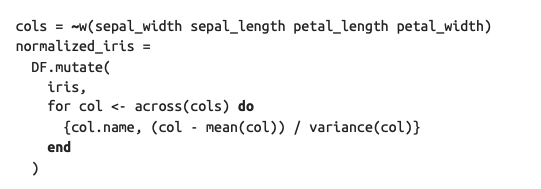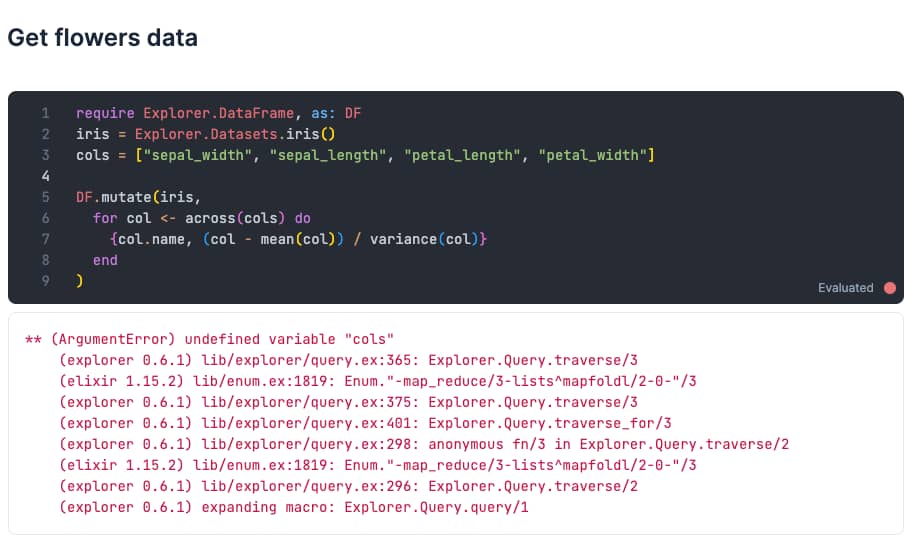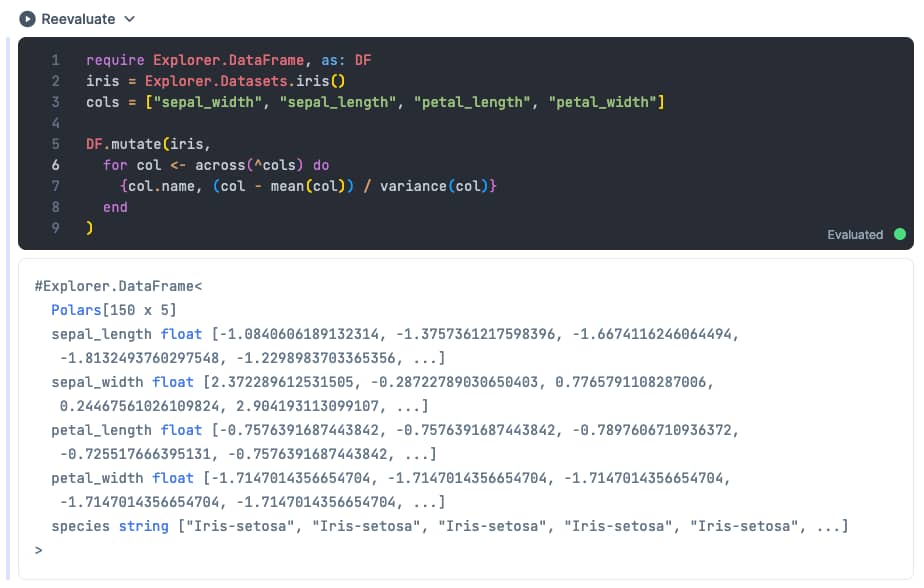Hello, I started the ml elixir book, the first code in this book has error for me 
require Explorer.DataFrame, as: DF
iris = Explorer.Datasets.iris()
cols = ["sepal_width", "sepal_length", "petal_length", "petal_width"]
DF.mutate(iris,
for col <- across(cols) do
{col.name, (col - mean(col)) / variance(col)}
end
)
Errors
** (ArgumentError) undefined variable "cols"
(explorer 0.6.1) lib/explorer/query.ex:365: Explorer.Query.traverse/3
(elixir 1.15.2) lib/enum.ex:1819: Enum."-map_reduce/3-lists^mapfoldl/2-0-"/3
(explorer 0.6.1) lib/explorer/query.ex:375: Explorer.Query.traverse/3
(explorer 0.6.1) lib/explorer/query.ex:401: Explorer.Query.traverse_for/3
(explorer 0.6.1) lib/explorer/query.ex:298: anonymous fn/3 in Explorer.Query.traverse/2
(elixir 1.15.2) lib/enum.ex:1819: Enum."-map_reduce/3-lists^mapfoldl/2-0-"/3
(explorer 0.6.1) lib/explorer/query.ex:296: Explorer.Query.traverse/2
(explorer 0.6.1) expanding macro: Explorer.Query.query/1
I am using LiveBook v0.10.0 and these deps:
Mix.install([
{:axon, "~> 0.5"},
{:nx, "~> 0.5"},
{:explorer, "~> 0.5"},
{:kino, "~> 0.5"}
])
It should be noted if I use the list directly it has not problem
require Explorer.DataFrame, as: DF
iris = Explorer.Datasets.iris()
DF.mutate(iris,
for col <- across( ["sepal_width", "sepal_length", "petal_length", "petal_width"]) do
{col.name, (col - mean(col)) / variance(col)}
end
)
why it has this error?
Thank you in advance
Hey @shahryarjb 
I didn’t try and I don’t own the book (yet), but based on the documentation if you want to access to all the columns in a for comprehension loop you just need to use across().
See this section Explorer.Query — Explorer v0.7.2
A for-comprehension can have multiple generators and filters. For instance, if you want to apply standardization to all float columns, we can use across/0 to access all columns and then use a filter to keep only the float ones:
Hope it helps, enjoy the reading 
These are not all the columns

but based on my top code, it I use
for col <- across( ["sepal_width", "sepal_length", "petal_length", "petal_width"]) do
it works but the
cols = ["sepal_width", "sepal_length", "petal_length", "petal_width"]
DF.mutate(iris,
for col <- across(cols) do
does not work.
If I use
DF.mutate(iris,
for col <- across() do
it shows me
** (ArgumentError) Explorer.Series.mean/1 not implemented for dtype :string. Valid dtypes are [:integer, :float]
(explorer 0.6.1) lib/explorer/series.ex:4692: Explorer.Series.dtype_error/3
/Users/shahryar/Desktop/ml.livemd#cell:anjlmkx4hegczaf3ubcadze2wqyuweq5:7: (file)
/Users/shahryar/Desktop/ml.livemd#cell:anjlmkx4hegczaf3ubcadze2wqyuweq5:6: (file)
/Users/shahryar/Desktop/ml.livemd#cell:anjlmkx4hegczaf3ubcadze2wqyuweq5:5: (file)
Ah I see, sorry I missed that.
I guess you can apply a filter based on the column type:
DF.mutate(iris,
for col <- across(), col.dtype == :float do
{col.name, (col - mean(col)) / variance(col)}
end
)

Honestly, I don’t know why the book suggests an usage of the across macro that is not contemplated by the documentation, or maybe I’m missing something 
It seems like Explorer.Query adopted a similar approach to Ecto.Query in its use of ^ for interpolation.
reference: Interpolation and Casting | Ecto.Query & Interpolation | Explorer.Query
p.s. It’s worth noting that the ^ in Ecto and Explorer is not the same as the ^ pin operator in Elixir – learn more about it here: https://stackoverflow.com/questions/73588330/why-do-ecto-queries-need-the-pin-operator
6 Likes
I think the author should change it in the book, @seanmor5
1 Like
![]()

























